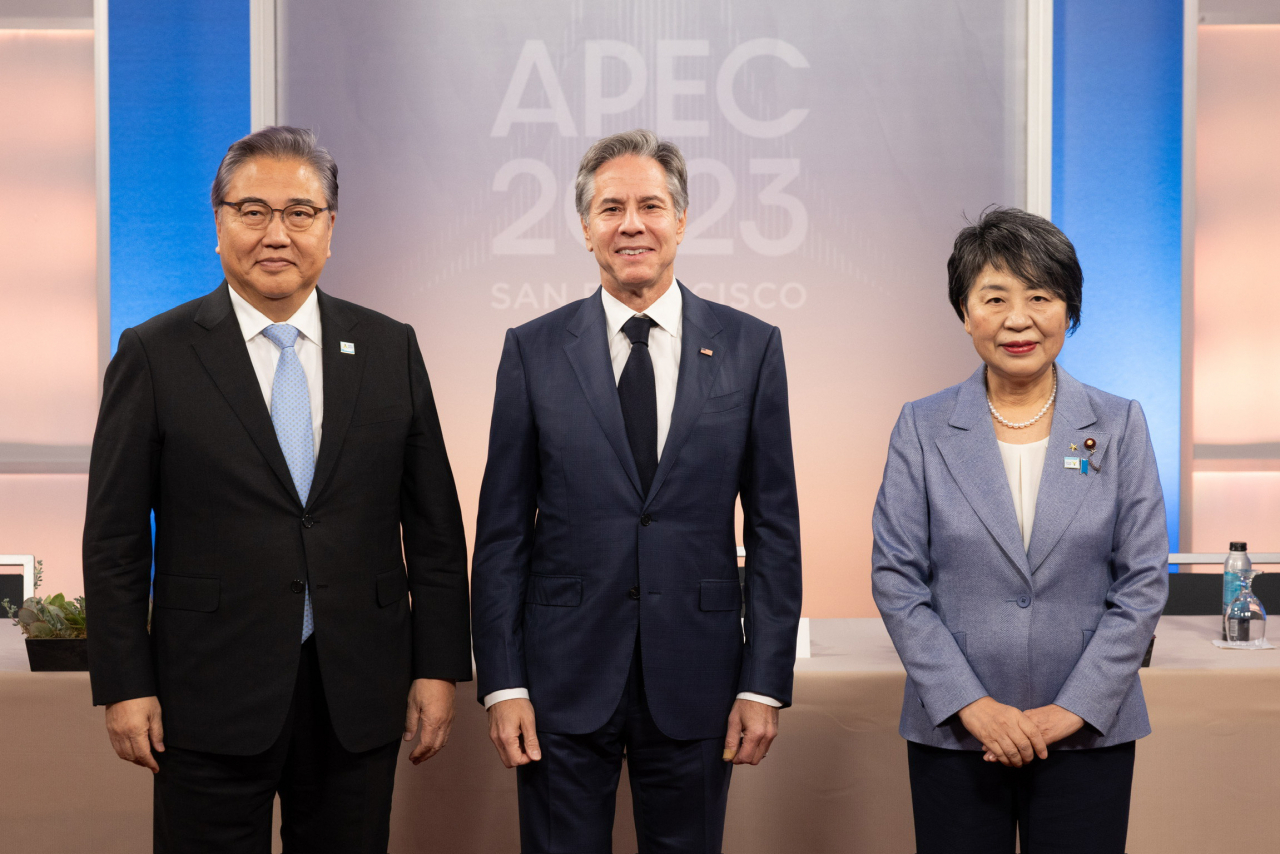Top envoys of S. Korea, US, Japan condemn NK missile launch
By Ji Da-gyumPublished : Dec. 21, 2023 - 16:17

The top diplomats of South Korea, the United States and Japan on Thursday issued a joint statement condemning North Korea's consecutive launches of short and long-range ballistic missiles, pledging concerted efforts to block the Kim Jong-un regime's channels for illicit revenue.
The joint statement was issued in the days following the UN Security Council meeting Tuesday, which, unfortunately, failed to produce any tangible actions once again to address North Korea's launches in violation of multiple UNSC resolutions.
The launches "serve as a reminder of the need for all countries to fully implement DPRK-related UN Security Council resolutions that prohibit the DPRK from acquiring technologies and materials to advance its unlawful missile program," it read, referring to North Korea by the acronym of the country's official name, the Democratic People's Republic of Korea.
The statement, attributed to South Korean Foreign Minister Park Jin, US Secretary of State Antony Blinken and Japan's Foreign Minister Yoko Kamikawa, indicated the need for China and Russia to enforce the UNSC resolutions collectively agreed upon.
The statement avoided explicitly naming the two countries, which both possess veto power as permanent members of the UNSC, and have opposed implementing measures against North Korea's ballistic missile launches.
"We will continue to work closely with the international community to block the DPRK’s illicit revenue generation funding its unlawful WMD and ballistic missile programs through the exploitation of overseas workers and malicious cyber activities."
North Korea launched a short-range ballistic missile Sunday, followed by the firing of an intercontinental ballistic missile Monday, seemingly in protest of the outcomes of the Nuclear Consultative Group meeting held Dec. 15. Seoul and Washington reached an unprecedented agreement to conduct a joint exercise simulating a North Korean nuclear attack to bolster interoperability between South Korea's conventional weapons and the US' nuclear capabilities in light of North Korea's persistent nuclear and missile development.
Kim Yo-jong, sister of North Korean leader Kim Jong-un, on Thursday issued a press statement carrying a scathing criticism of the meeting at the UNSC.
"It is very regretful," she said in the English-language dispatch. "I feel very unpleasant over the fact that the UNSC convened an open meeting according to the brigandish demand of the US and its satellite countries and brought up the sovereign right of the DPRK into discussion, and strongly condemn it."
North Korean leader Kim Jong-un also escalated saber-rattling activities following the country's purported "launching drill" of the solid-fuel Hwasong-18 ICBM on Monday.
Kim invited the soldiers of the Second Red Flag Company under the General Missile Bureau, who participated in the missile launching drill, to the office building of the Party Central Committee in Pyongyang on Wednesday, North Korean state media reported Thursday.
Kim said the ICBM launch was a "demonstration of the loyalty and strong stand of the DPRK's armed forces defending the sovereignty of the country."
The launch was a "clear explanation of the offensive counteraction mode and the evolution of the nuclear strategy and doctrine of the DPRK not to hesitate even a nuclear attack when the enemy provokes it with nukes."
South Korea's Foreign Ministry on Thursday dismissed Pyongyang's claims.
"North Korea's outright rejection of the authority of the United Nations, as it labels nuclear and missile provocations prohibited by multiple UN Security Council resolutions -- unanimously adopted by the international community -- as sovereign rights and self-defense, clearly demonstrates that it, in and of itself, poses a threat to international peace," said Foreign Ministry spokesperson Lim Soo-suk.




















